Study in Italy
Why Study Abroad in Italy?
Italy is home to the oldest university of Bologna, proving the status Italy provides world class education program; here you will get the rich experience of varied cultures and landscapes. With inexpensive travelling experience, Italy is very beautiful to explore.
More information about Italy includes:
- Well-structured courses and academic year
- Affordable studies and cost of living
- High visa success rate
- Beautiful atmosphere
- The cultural mix of international students
Quick Facts About Italy
- Italy is a country located in Southern Europe.
- Italy is known for its art, architecture, fashion, and cuisine.
- The most popular programs in Italy include degrees in business, engineering, computer science, and law.
- Italy has 72 listed universities and 550 study programs.
- Italy's official language is Italian. French, German, Slovene, and Ladin are additional recognized languages.
Benefits of Studying in Italy
- One of the most preferred place by international students
- Around 95% of student visa success rate.
- Beautiful landscape and diverse cuisine
- Affordable education and living expenses
Higher Study Options
| Part-time work duration allowed | Post-study work permit | Can departments work full-time? |
Bachelors | 20 Hours per week | 6 months | No |
Masters (MS/MBA) | 20 Hours per week | 6 months | No |
Requirements for Students Applying to Italy
To be eligible to study in Australia, you must meet the following criteria:
- TOEFL/IELTS. One of the tests one can take is TOEFL (Test of English as a Foreign Language). Another test one can take is IELTS (International English Language Testing System). Both of these tests contain questions related to the reading/writing and reasoning skills of an individual, each section contains 200 marks.
- Educational qualifications. These include all the certificates and report cards that the applicant holds like diploma, high school degree, graduation degree, and master’s degree.
- Photo Copies of the first and last pages of your passport. Your passport is your primary identity document, it showcases your nationality. Travelling without a passport is not possible internationally.
Steps to Start Studying in Italy
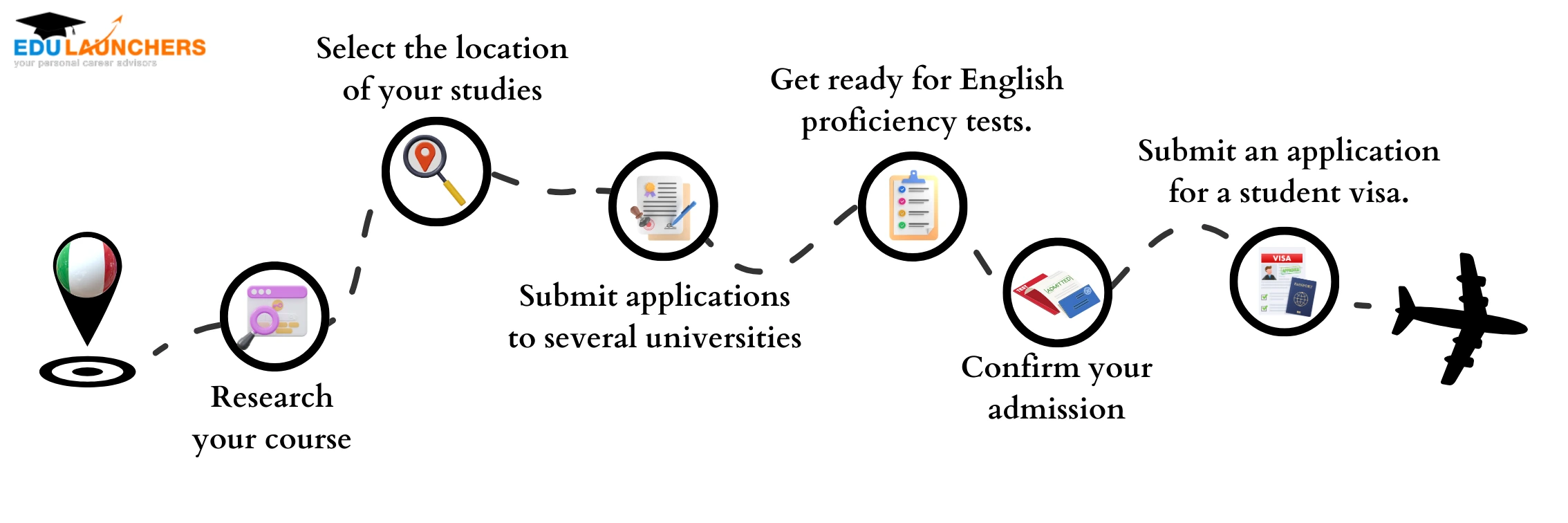
Eligibility to Study in Italy
- To qualify for graduation, a minimum of 60% must be attained from an educational institute.
- During the graduation period, individuals should not exceed 10 backlogs to meet the eligibility criteria.
- IELTS score should be at least a band of 6.
Educational Requirements to Study in Italy
Study Options | Educational Requirement | Minimum Required Percentage | IELTS/PTE/TOEFL Score | Backlogs Information |
Bachelors | 12 Years of Education (10+2) or 10 +3 years of diploma | 60% | Overall, 6.0 with 5.5 in each band | Up to 10 backlogs (some private hospital universities may accept more) |
Masters (MS/MBA) | 3/4 Years of Graduate Degree | 60% | Overall, 6.5 with no band less than 6 |
Cost of Study in Italy for Indian Students
The cost of studying in Italy for Indian students can vary depending on factors such as the chosen university, program, location, and lifestyle. Generally, public universities in Italy offer lower tuition fees than private institutions.
Study program | Annual fees in Euros |
Undergraduate Program | 900 – 4,000 |
Post-graduate/master’s program | 2,000 – 3,500 |
Language Requirements: While some universities in Italy offer English-taught programs, it is beneficial for Indian students to understand the Italian language. Knowing the local language can enhance the overall study abroad experience, facilitate daily life interactions, and open doors to more opportunities. However, English language proficiency tests like IELTS or TOEFL may be required for admission to English-taught programs.
Study Gap Acceptability: Italian universities generally accept a study gap of up to two years for undergraduate programs and up to five years for postgraduate programs. However, it is essential to note that individual universities may have specific requirements and may consider study gaps on a case-by-case basis.
| S.No | Universities | Average Tuition fees |
| 1. | IULM University of Milan | €9,800 annually |
| 2. | University of Genoa | €3,000 annually |
| 3. | Sacred Heart University | €15,800 annually |
| 4. | University of Milan | €4,000 annually |
| 5. | University of Pavia | €5,000 annually |
| 6. | University of Trento | €4,000 annually |
| 7. | University of Padua | €3,000 annually |
Upcoming intakes in Italy
Italian universities and colleges offer 2 intakes. It is advisable to submit your application 4 to 8 months before the commencement of the academic session for better chances of success.
Intake 1 | Intake 2 |
September | February |
Study Options | Duration | Intake Months | Deadline to Apply |
Bachelors | 3 Years | September (major) and February (minor) | 6 – 8 months before the start of an academic session |
Masters | 2 Years | September (major) and February (minor) |
Popular Universities in Italy

Sapienza University of Rome
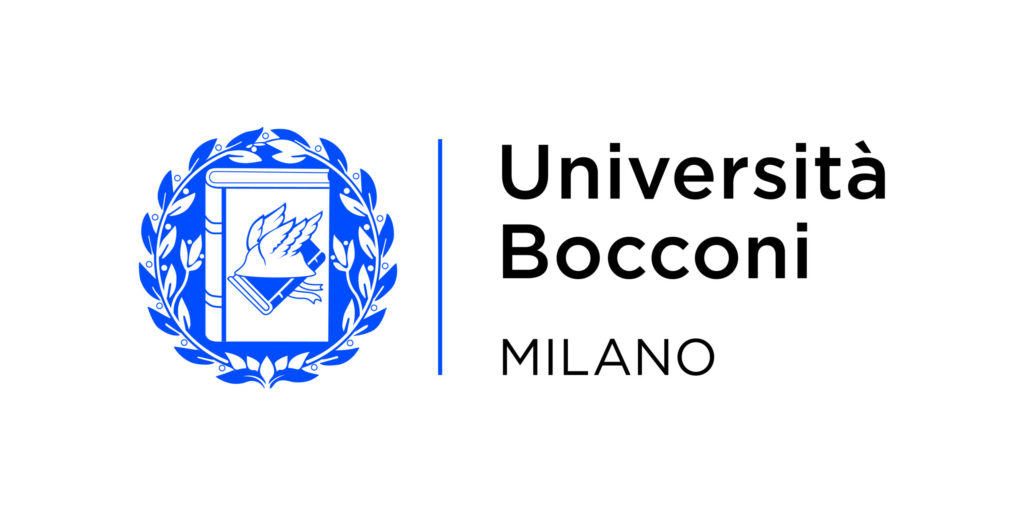
Bocconi University

University of Naples Federico

University of Bologna
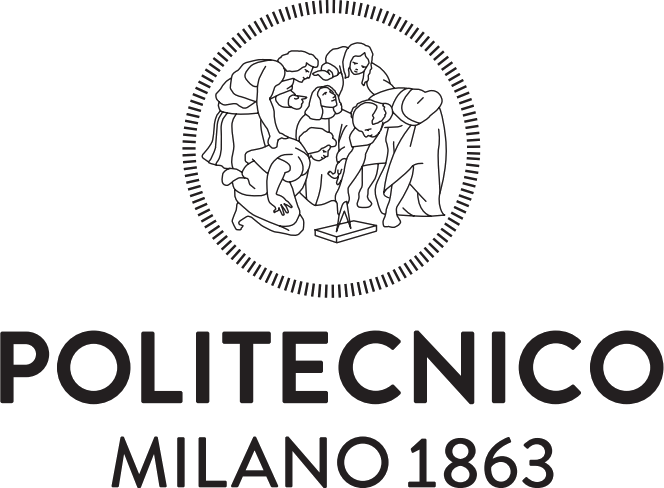
Politecnico di Milano

University of Salerno

Vita-Salute San Raffaele University
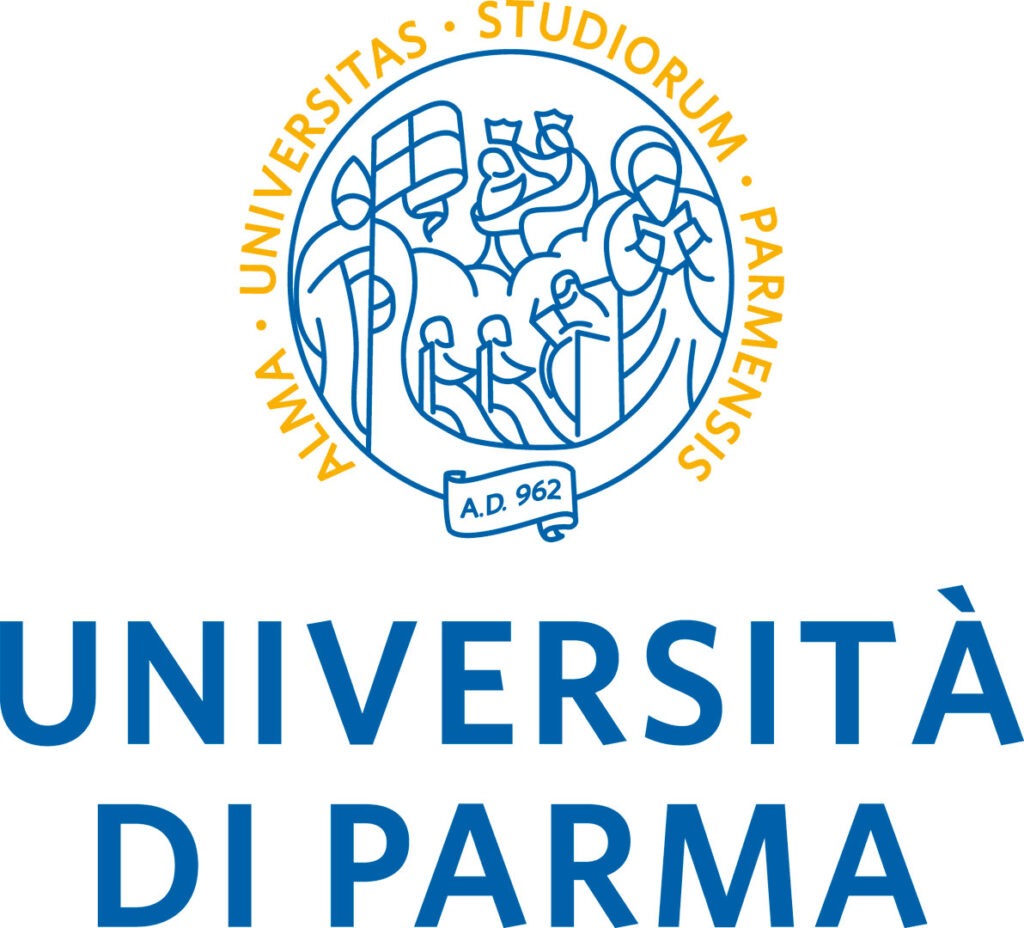
University of Parma
Top 5 Universities in Italy 2024
Global rank | Universities |
123 | Politecnico di Milano |
134 | Sapienza University of Rome |
154 | University of Bologna |
219 | Università di Padova |
252 | Politecnico di Torino |
Top Courses to Study in Italy

- Art and Design
- Social Studies
- Science
- Health
- Economics
- Hospitality
Scholarships Provided to Students
Scholarship name | Amount per year |
EDISU Piemonte Scholarships | Up to €8,100 |
Padua International Excellence Scholarship Programme | Up to €8,000 |
Tuition Fee Waivers at the University of Pavia for International Students | Up to €8,000 |
Bocconi Merit and International Award | Up to €14,000 |
Politecnico de Milano Merit-Based Scholarships for International Students | Up to €10,000 |

Work Authorization for Students
In universities in Italy, the government offers options for international students to work after their studies where students are allowed to stay 2 more years after their graduation, and a post-study visa for work can be up to 5 years.
Types of Italy Student Visa
Visa type C: short stay visa, applicants should choose this if they want to take part in short courses that last up to maximum of 90 days.
Visa type D: long stay visa, applicants choose this if they want to take up a course that is of 20 course hours per week and lasts more than three months.
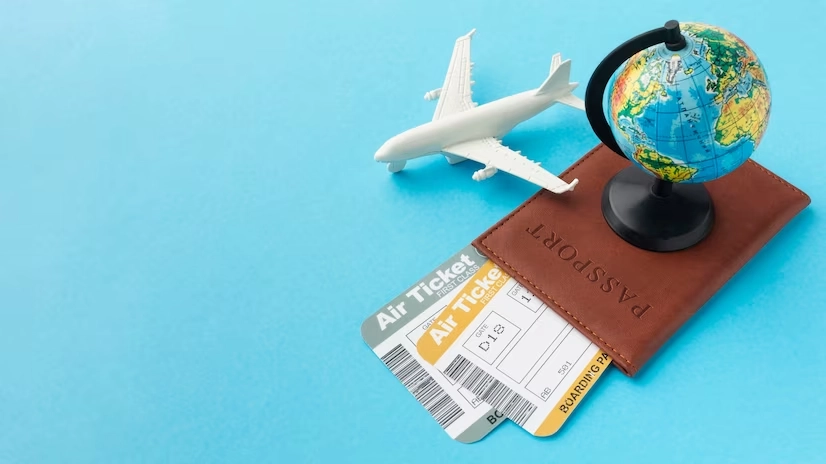
Italy Student Visa Requirements
- Acceptance letter: A document that you will get from the university in which you have been selected. This document states your courses and your time durations of those courses.
- Proof of funds: applicants have to provide the details of any account that they have to prove that they have sufficient funds for tuition fee and for maintain the living costs of the country.
- Character certificate: to ensure that you have a clean background and no pending or closed criminal records universities asks for a character certificate. This ensures you have no bad intentions and you are a positive member of the society.
- English proficiency: applicant must have the minimum score that is required by the university in any English proficiency test like IELTS or TOEFL to prove that English is your medium of language.
How to Apply for a Canada Student Visa?
Step 1. First, find out if you qualify for a student visa to Italy.
Step 2: Set up the document checklist.
Step 3: Obtain a visa online.
Step 4: Await the result.
Step 5: Take a flight to Italy to further your studies.
Visa Processing Time
Processing Time for visa for Italy is around 1 month. It is advised that you should apply your visas around 2 – 3 months before your course starts. Success rate for student visa to Italy is 98% so there is just a slight chance that your visa will be delayed. Submit correct documents for smoother working of your visa processing.
Why Choose EduLaunchers for Studying in Italy?
EduLaunchers is one of the best Study Visa Consultants established in 2018, dedicated to providing services to Indian students to avail educational opportunities abroad. Our main activity is to help students make the right choice regarding pursuing education in foreign educational institutions. Edulaunchers provides information about higher education in various countries like USA, UK, Australia, New Zealand, and France and has a command over the education system. We aim to enable our students to gain admission into suitable, recognized universities in the USA, UK, Canada, Australia, and Germany. Our long-standing tie-up and close association with various universities/institutes have facilitated the speedy execution of admission and other formalities, giving students quick and easy access to the university and course of their choice.
Recently Graduated Students



Our Latest Blog
Recently Asked Question
The cost of studying in Italy can vary depending on the university, program and level of study. Public universities in Italy generally have low tuition fees, ranging from around 1,000 to 4,000 Euros per year. However, tuition fees at private universities can be high, ranging from 6,000 to 20,000 euros per year. You should also consider other expenses such as housing, cost of living, and health insurance.
Italy universities have low tuition fees, and no IELTS exam scorecard is required. This means that international students can study in Italy without IELTS.
When enrolling in a university in Italy, you must prove your proficiency in Italian. However, if your desired degree is not taught in Italian, you will not need to prove Italian proficiency. However, other requirements may depend on the course you are applying for.
If you are applying for a bachelor’s program, a maximum gap of 2 years is acceptable, and for a master’s degree, a maximum gap of 8 years is acceptable.
Applications must be sent exclusively through the Study in Italy portal. Applicants must have valid passport or identity card. It is not necessary to apply separately to a university. Italian Government Scholarship Program manages the placement of selected students.
You must prove that you have lived in Italy for the last 5 years. You must be able to present a clean criminal record. You must pass an Italian language test to prove you have a proficiency level of at least A2. You must have sufficient income to support yourself and your dependents.





